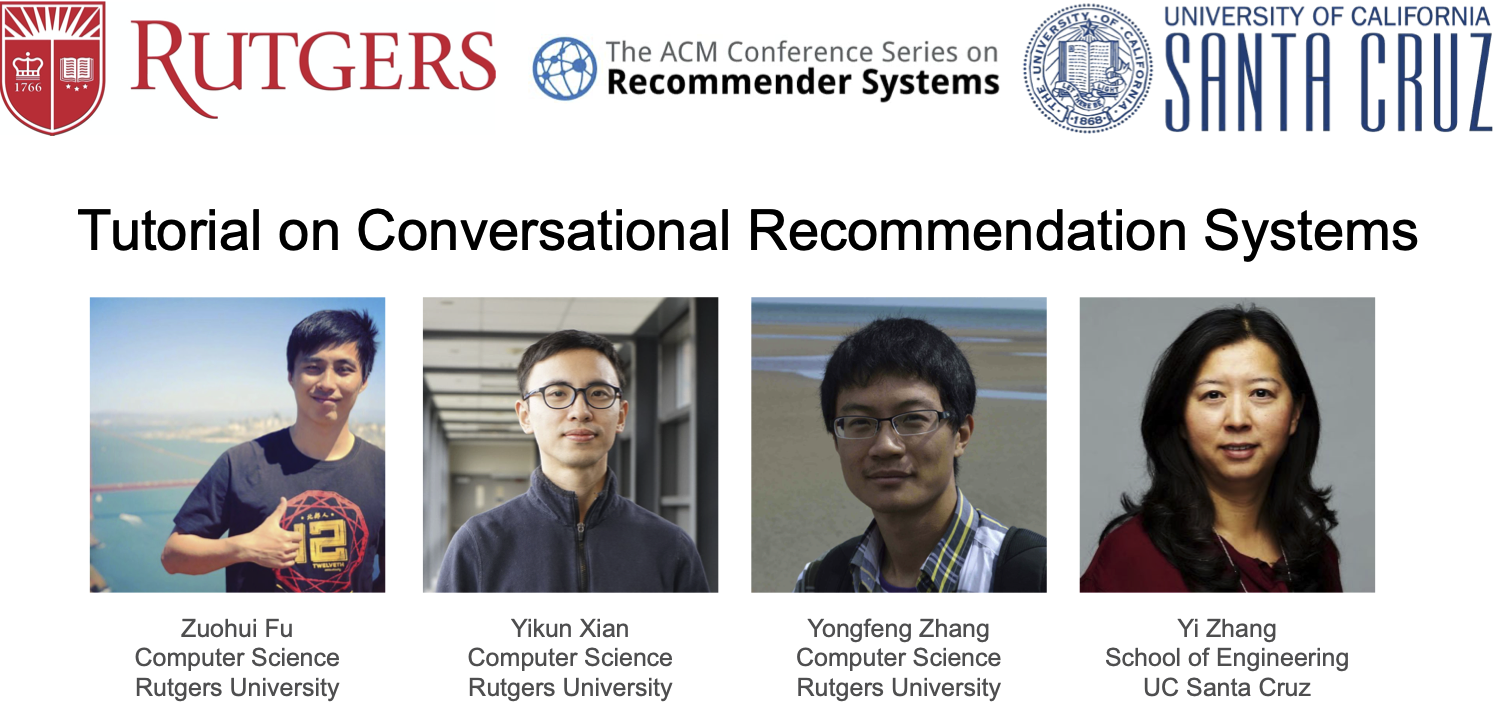Tutorial on Conversational Recommendation Systems
Abstract
Recent years have witnessed the emerging of conversational systems, including both physical devices and mobile-based applications. Both the research community and industry believe that conversational systems will have a major impact on human-computer interaction, and specifically, the RecSys community has begun to explore Conversational Recommendation Systems. Conversational recommendation aims at finding or recommending the most relevant information (e.g., web pages, answers, movies, products) for users based on textual- or spoken-dialogs, through which users can communicate with the system more efficiently using natural language conversations. Due to users’ constant need to look for information to support both work and daily life, conversational recommendation system will be one of the key techniques towards an intelligent web. The tutorial focuses on the foundations and algorithms for conversational recommendation, as well as their applications in real-world systems such as search engine, e-commerce and social networks. The tutorial aims at introducing and communicating conversational recommendation methods to the community, as well as gathering researchers and practitioners interested in this research direction for discussions, idea communications, and research promotions.
Outline
- Introduction and Background
- Introduction to Conversational Recommendation
- A Brief History of Conversational Recommendation Research
- The New Boom in Conversational Recommendation Research
- Problem Formalization
- Basic Problem Formalization
- Paradigm 1: System is Active, User is Passive (SAUP)
- Paradigm 2: System is Active, User Engages (SAUE)
- Paradigm 3: System is Active, User is Active (SAUA)
- Challenges
- Datasets and Evaluation
- Frequently Used Datasets
- Evaluation Protocol
- Conversational Recommendation Methods
- Three Architectures of Conversational AI Systems
- Four Major Modules for Conversational Recommendation
- Natural Language Understanding/Generation
- Dialog State Managment
- Recommendation
- Explanation
- Tool-kits and Real-world Systems
Material

Presenters
Zuohui Fu is a Ph.D. student in the Department of Computer Science at Rutgers University, jointly advised by Prof. Yongfeng Zhang and Prof. Gerard de Melo. His research interests focus on solving the cutting-edge research problems over Information Retrieval, Natural Language Processing and Machine Learning, with the emphasis on semantic matching, dialogue systems, and decision making over knowledge graphs, etc. His recent research mainly aims at knowledge graph assisted explainable, fair and conversational recommender system. His works have appeared in premier IR and artificial intelligenceconferences including AAAI, SIGIR, WWW, IJCAI, ACL, etc. Besides, he has served as the conference PC member in NeurIPS, AAAI, ACL, EMNLP, CIKM, etc., and the journal reviewer for ACM TOIS, etc.
Yikun Xian is a Ph.D. student at the Department of Computer Science of Rutgers University, jointly advised by Prof. Yongfeng Zhang and Prof. Shan Muthukrishnan. His research interest broadly lies in the intersection of information retrieval and machine learning. His recent research include graph-based explainable decisionmaking problems with applications to explainable recommendation, knowledge-enhanced and explainable conversational recommendation, as well as interpretable comparative shopping. He mainly develops machine learning techniques such as graph-based reasoning, neural symbolic reasoning and deep reinforcement learning for information retrieval and recommender systems. He has served as PC member/reviewer in top computer science conference/journals such as NeurIPS, EMNLP, CIKM, SIGIR, ECML-PKDD, WWW, ECIR, RecSys, and ACM TOIS.
Yongfeng Zhang is an Assistant Professor in the Department of Computer Science at Rutgers University (The State University of New Jersey). His research interest is in Information Retrieval, Recommender Systems, Machine Learning, and Internet Economics. In the previous he was a postdoc in the Center for Intelligent Information Retrieval (CIIR) at UMass Amherst, and did his PhD and BE in Computer Science at Tsinghua University, with a BS in Economics at Peking Univeristy. He is a Siebel Scholar of the class 2015, and a Baidu Scholar of the class 2014. He has been consistently working on conversational recommendation, explainable recommendation, and the intersection between the two subjects. His recent work on conversational recommendation models includes learning to ask for conversational recommendation, explainable conversational recommendation, and knowledge-enhanced conversational recommendation.
Yi Zhang is a professor in the School of Engineering, University of California Santa Cruz. Her research interests include large scale information retrieval, recommendation systems, internet advertising, data mining, natural language processing, and applied machine learning. She has published chapters, journal articles, and papers at top conferences in these areas, such ACM SIGIR, WWW, CIKM, IEEE ICDM, ICML, COLINGS, HLT. She received NSF Faculty Early Career Award in 2010, an Air Force Research Young Investigator Award in 2008, the Best Paper Award at ACM SIGIR in 2002, and several other awards. Her Information Retrieval and Knowledge Management Lab is doing research sponsored by several government agencies and companies (Microsoft, Yahoo, Google, NEC, Bosch, Nokia etc.). She has served as a consultant or technical advisor for companies. She regularly serves on the program committees of the very best conferences in her research areas. She has served as area chair or senior PC member at ACM SIGIR, EMNLP, and ACM Recommender Systems. She has served as conference co-chair in charge of Information Retrieval area at the ACM Conference on Information and Knowledge Management, and tutorial chair for ACM SIGIR. She is serving as an associate editor for ACM Transaction on Information Systems. Dr. Zhang received her Ph.D. from School of Computer Science at Carnegie Mellon University, specializing in Language and Information Technologies.